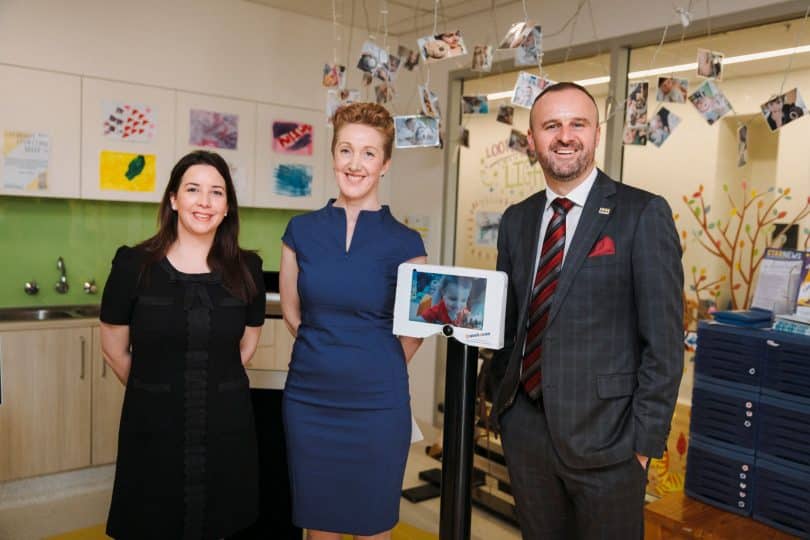MissingSchool was featured in an article from The Riot ACT. To view the original article click here.

Head of St.George Foundation Vanessa Barry, MissingSchool chair Megan Gilmour and Chief Minister Andrew Barr with the telepresence robot. Photo: Ben Develin.
The ACT will host an Australia-first trial of innovative technology that will keep children recovering from illness or injury connected to their school community.
St.George Foundation and not-for-profit organisation MissingSchool announced at the Centenary Hospital for Women and Children funding of up to $600,000 over three years to enable the telepresence robot pilot.
MissingSchool’s pilot, with support from the ACT Government, will place telepresence robots in willing schools to demonstrate that continuous two-way connection is possible between seriously sick children and their classrooms when they are absent, missing school.
MissingSchool Chair, Megan Gilmour said the telepresence robots could be operated in real time by the student from a laptop, tablet or even phone they have with them in hospital or at home that enables them to receive the same instruction that they would receive with their peers.
“They can control the movement of the robot and be seen through a video screen and heard through a speaker phone on the robot,” she said. “Also the student can see and hear their teachers and peers in the classroom because the robot is there.”
She said the robot could be moved by the student remotely so they could go to assembly or the library with their peers.
MissingSchool is a volunteer not-for-profit organisation established in 2012 by Ms Gilmour and two other Canberra
mothers whose sons were treated on the Turnbull Ward of the Sydney Children’s Hospital for their critical and life-threatening illnesses.
Ms Gilmour believed that maintaining a connection with school could also assist the healing process.
“This was borne out of my experience with my son where I could see him losing hope and I thought how will I show him how he is going to survive and I turned straight to school education because its such a big part of a child’s life, and the community is such a big part of a child’s life,” she said.
“So in that respect my own feeling is that it is a protective factor for them in a setting that is full of risk and gives them hope.”
She said that tens of thousands of sick kids in Australia, who miss school often or for long periods, can potentially fall behind academically and experience isolation from their school communities leaving lifelong effects on productivity, and social and emotional wellbeing.
Ms Gilmour pitched this idea to the St.George Foundation from the Netherlands, while on a Churchill Fellowship in countries using similar solutions at scale.
“I know that Australia can take this leap for sick kids,” she said.
Head of St.George Foundation, Vanessa Barry said the Foundation’s new Inspire Grant supported innovative interventions that change the course of children’s lives.
“This year we’re thrilled to award it to MissingSchool for their work on education connection for sick kids in Australia,” she said.
“St.George Foundation funded MissingSchool’s research, released in 2015, which revealed a gap in education provision and prompted the first Commonwealth-funded research into the issue for kids who are facing the hardest challenge of their lives.”
ACT Education Minister Yvette Berry has agreed to explore a limited trial making the ACT the first jurisdiction in the national pilot, and one of only a handful in the world to trial this solution.
Chief Minister Andrew Barr joined the announcement, affirming the ACT’s push to strengthen inclusion and innovation in ACT schools and its leadership in school connectivity and digital transformation.
The St.George Foundation grant will help MissingSchool roll out up to 75 robots over three years to demonstrate cost-effective and innovative ways to include these children in their regular schools.
“Medical science is saving and prolonging the lives of sick kids and we must act now to give them real-time inclusion in their classes and connection with their friends and teachers, to have hope and build positive futures,” said Ms Gilmour.
”The approach MissingSchool is pursuing demonstrates the way complex social challenges can be tackled by combining the strengths of government, private sector, and not-for-profits.”
Ms Gilmour said the innovation was not just about the tech but the methodology.
“So that it happens in the systems where it should happen, everywhere, everyday for every sick kid,” she said.
She said the ACT was the perfect jurisdiction for the pilot because of its size.
“We have also been working here in ACT since 2012, so we wanted to ask here first,” he said.
To find out more visit missingschool.org.au